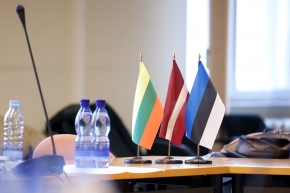 Gallery
Gallery
On Friday, 14 October, the Joint Judging Committee convened in the Saeima to evaluate nominees for the Baltic Assembly Prizes, and it decided to award the Prize for the Arts to Andris Nelsons, a conductor; the Prize for Literature to Arvydas Juozaitis, a philosopher and writer; and the Prize for Science to Andres Ilmar Kasekamp.
Andris Nelsons has been chosen to receive this award for his outstanding achievements in promoting the performing arts and creating a positive image of Latvia in the world. Inga Šteimane, Latvian member of the Joint Judging Committee, noted that Andris Nelsons perfectly met the three criteria set by the Statutes on the Baltic Assembly Prizes. “He is talented, and his unique musicality is praised by everybody. Andris Nelsons has built a successful career as attested by his international achievements. Moreover, he promotes the Baltic States, Latvia.” That is attested by the words published on the website of the Birmingham Symphony Orchestra: “The 30-year-old Latvian is a paragon of musicality,” stressed Šteimane.
Arvydas Juozaitis has been chosen for the Prize for Literature for his book Riga – No One‘s Civilization (2011). Danielus Mušinskas, Lithuanian member of the Joint Judging Committee, emphasised that Lithuania has been competing for the Prize for Literature and that it is gratified that Lithuania has finally succeeded. “Juozaitis is not a classical prosaic writer. He has a new approach that is unprecedented in contemporary literature. It is unexpected and interesting,” noted Mušinskas.
Andres Ilmar Kasekamp has been selected to receive the Prize for Science for his volume History of the Baltic States (2010). Andris Sprūds, member of the Joint Judging Committee, pointed out that this work has not only scientific value. “This book keeps the Baltic concept alive. It invites us to look at ourselves not as different nations but as nations that have much in common. Furthermore, this book puts the Baltic States on the map of world literature. And that is the goal of this Prize,” said Sprūds.
It is planned to award the prizes during the BA session that will take place on 24–25 November in Tallin. Each prize is EUR 5,000.
The Joint Judging Committee consists of nine experts in literature, science and the arts from Estonia, Lithuania, and Latvia.
The other nominees for BA Prize of this year were as follows:
in literature:
• Indrek Hargla (Estonia), writer. Nominated for his series of novels Apothecary Melchior and the Mystery of St. Olaf’s Church, Apothecary Melchior and the Ghost from Rataskaevu Street, and Apothecary Melchior and the Hangman’s Daughter;
• Inese Zandere (Latvia), poet. Nominated for her collection of literary fairytales Latvian Animals (2009) and collection of poems Adventures of Princesses (2010).
in the arts:
• Tatjana Kozlova (Estonia), composer. Nominated for her ensemble work Dimension of Quiescience (2009/2010);
• Vytautas Juozapaitis (Lithuania), vocalist, opera singer. Nominated for his creative activities, spreading the vocal art traditions that have enriched the musical life of the Baltic region.
in science:
• Zenonas Butkus (Lithuania), professor, nominated for his collection of historical documents The Idea and Practice of the Unity of the Baltic States in 1918-1940. A Collection of Documents (2008);
• Jānis Zilgalvis (Latvia), nominated for his book Vecgulbene Manor (2011).
The BA Prize was established in 1994, and in recent years it has been awarded to several well-known persons in the field of culture. In 2010, Ene Mihkelson, a poet and prose writer from Estonia, received the Prize for Literature for her poetry collection Torn (Tower). Antanas Žukauskas, an artist and sculptor from Lithuania, was chosen for the Prize for the Arts for communicating past values in the fine arts, striking the right balance between the modern and the traditional, and for promoting awareness of Baltic identity in the world. Jānis Stradiņš was awarded the Prize for Science for his book The Beginnings of Science and Higher Education in Latvia.
The Baltic Assembly is an interparliamentary cooperation organisation of Latvia, Estonia and Lithuania which was founded on 8 November 1991. The Baltic Assembly consists of 12 to 20 members from each country’s parliament. The Baltic Assembly is a coordinating and consultative organisation which has the right to express its opinion to national parliaments, governments and the Baltic Council of Ministers in the form of resolutions, decisions, declarations and recommendations; it can also request answers from these institutions on activities regarding cross-border issues that are on the BA agenda.
Pictures from the meeting of the Joint Judging Committee are available at: https://www.flickr.com/photos/saeima/sets/72157627765610647/
For public use of any material, please give credit to the Saeima Chancellery
Saeima Press Service







